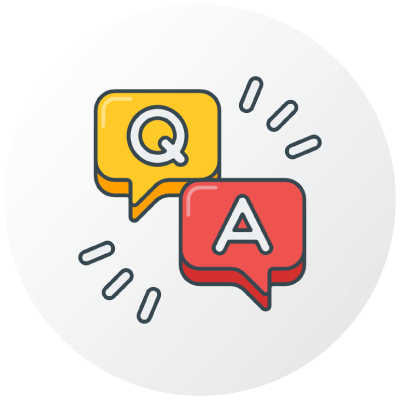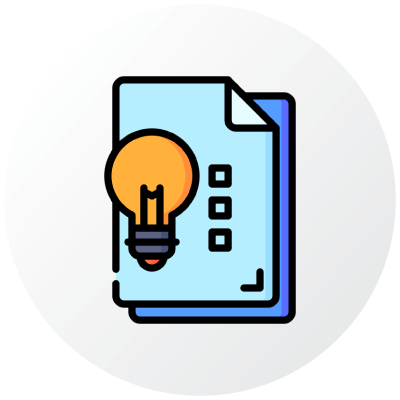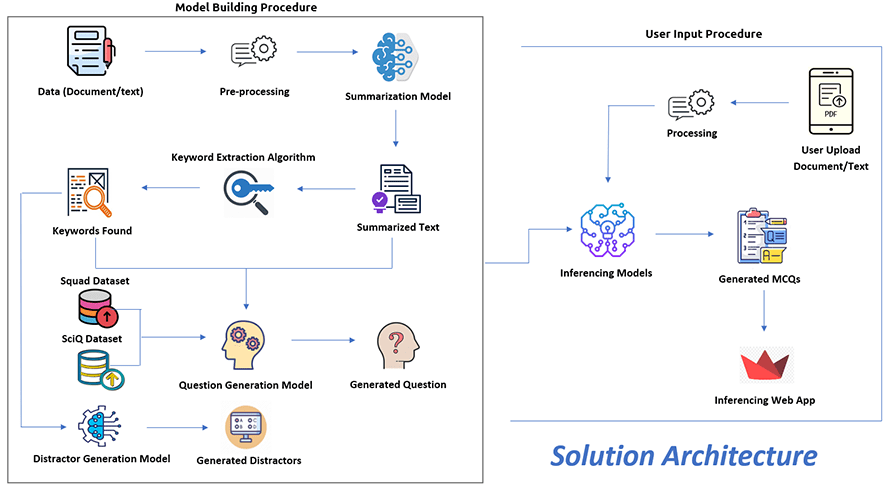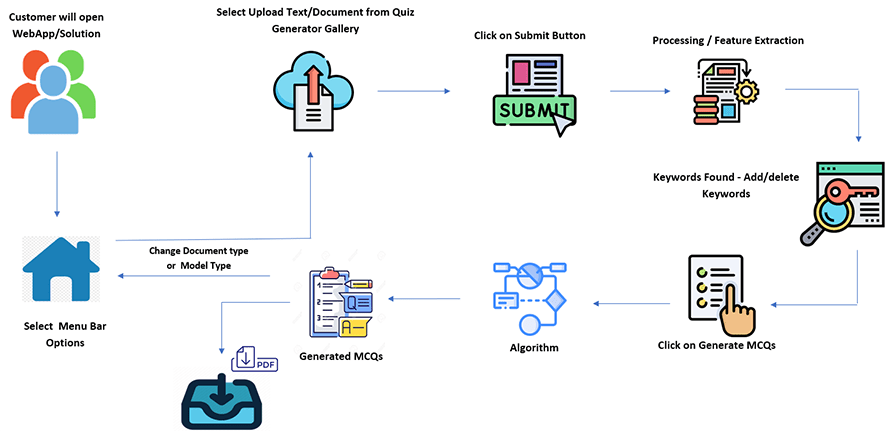Designing a Quiz Generator Solution Using Artificial Intelligence

Written by Hafsa Mustafa
Technical Content Writer
November 19, 2022
Artificial Intelligence is revolutionizing the education industry as much as any other industry out there. According to Global Market Insights, the market for AI in the education sector stood at $2 billion in the year 2021 and is expected to grow at an estimated 45% Compound Annual Growth Rate from 2022-2030.
Communities stand to gain a lot from AI-related advancements as educational technology (EdTech) is likely to dramatically change the way students and teachers interact, course work is taught and crafted, how academic performance is assessed and evaluated, and the overall anatomy of learning environments.
In this blog, we will present a POC that has been designed by our data scientists to automate the generation of quizzes and tests from any given piece of text. The purpose is to reduce the time that an average academician or publisher invests in creating assessments for exams or online courses.
Problem Statement
Creating assessments manually can prove to be a laborious task as it tends to consume a lot of time, energy, and effort. Oftentimes, people feel the need to outsource people or hire freelancers to get the job done. There is a need to design a scalable solution that can automatically generate quizzes from any given document without requiring any sort of human intervention or assistance to make things easier for professionals.
Available Solutions
Several helpful solutions are available in the market that can make things easier for students and professionals. Some top-ranking options are listed below:

Questgen
Utilizes GPT-3 and NLP to craft questions for publishers, HR teams, examiners, etc.

PrepAI
Uses Artificial Intelligence to generate question-answer pairs for tests.

Quillionz
Employs Machine Learning and AI to create customized test papers.
These solutions, though easily available, require paid subscriptions. While some solutions contain an easy interface, others present complex landscapes that often make things complicated for the users.
Our Solution
Royal Cyber’s data experts envision an AI-powered Quiz Generator Solution as the perfect answer to this problem. We suggest using Natural Language Processing to generate assessments – which can be in the form of quizzes, worksheets, or exam papers – from any kind of document or text. The suggested solution works by identifying the problems that need to be inspected from the given content.
Our Target Audience
- Educational institutes & online learning platforms that need to create worksheets or exam papers
- Human Resource professionals who are often required to draft documents for compliance and personnel assessment
- Publishers that need to make a large number of assessment questions from textbooks to assist students with the preparation
Our Methodology
We have used the following techniques in our POC:
- Summarization
- Keyword Extraction
- Question Generation
- Distractors Generation
- Summarization
- Keyword Extraction
- Question Generation
- Distractors Generation
Summarization
We began by using summarization on the document. We used the Google T5 model to perform the abstractive summary. By doing this, we ensure that the algorithm does not just simply pick up certain lines and present them as questions but instead rephrases the lines if necessary. We prepended our text with ‘summarize’ before sending it to the T5 summarizer.
Keyword Extraction
The second stage that we carried out was keyword extraction. For this, we used PKE (Python Key phrase Extraction Library) and the Multipartite Rank algorithm. Our method involved extracting keywords from both the original text and the summarized text, comparing those keywords across both texts, and finally preserving only those keywords that were present in both texts.
Question Generation
After extracting keywords, we moved to the next stage; question generation. To do this, we used the T5 pre-trained model that was trained on the Squad v1.1 dataset for question-answering tasks. So, in essence, we were giving the T5 model the summary as a context and the keyword as an answer, so the model would then produce a question.
Distractors Generation
The last step is distractors generation. It refers to the process of generating the wrong choices of MCQs. For this, we have used the sense2vec vectors where we query with the given word or phrase and get back similar words or phrases in the vector space. But there is a problem, if we query sense2vec with a word that has several similar words, we may encounter many near-duplicates and misspelled words which we need to filter. We also encounter other duplicates from which we have to select only those who are best to be kept as distractors. We tackled this problem of filtering near duplicates by effectively using sentence transformer embeddings and Maximum Marginal Relevance.
An architectural diagram has been given below to summarize the whole process that we followed to build our solution.

Customer Journey
The customer only needs to open our web application, select the menu bar options, upload the document from the gallery, and click on the submit button. This sets off the process of feature extraction, which leads to keyword options. Here, the user needs to choose the keywords of choice. After selecting the terms, they need to click on ‘Generate MCQs.’ Once multiple choice questions have been generated, the user can download the file in their system.

Business Benefits
Our solution is expected to provide the following business benefits:
- 79% reduction in time and effort for educational institutions
- 12x faster generation of compliance materials for HR departments
- Textbook publishers and E-learning companies can save up to 78% of their costs
Conclusion
This blog discusses how Artificial Intelligence can be used to develop educational technology that can facilitate the overall learning process. Over the years, Royal Cyber data scientists have designed efficient Machine Learning solutions and AI technologies to help businesses and organizations in achieving maximum productivity and ROI. You can contact our data experts to discuss your unique enterprise needs and work out a tailor-made solution.
Recent Blogs
- An Insight into ServiceNow Hardware Asset Management (HAM) Ramya Priya Balasubramanian Practice Head ServiceNow Gain …Read More »
- Learn to write effective test cases. Master best practices, templates, and tips to enhance software …Read More »
- In today’s fast-paced digital landscape, seamless data integration is crucial for businessRead More »





